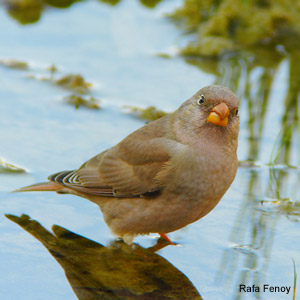Magazine | Analyses
Le Roselin githagine en Espagne, un grand gagnant du réchauffement ?

Roselin githagine (Bucanetes githagineus) mâle sur le Cabo de Gata (Almería) en Andalousie (Espagne) en septembre 2011.
Photographie : Rafael Fenoy / Elcolordelcabo.es
Introduction
Le Roselin githagine (Bucanetes githagineus) est un joli passereau nichant dans les zones arides et semi-arides depuis les îles Canaries et l’Espagne jusqu’au Pakistan en passant par l’Afrique du Nord et le Moyen-Orient. Le premier cas de nidification espagnol a été prouvé en 1971 dans le sud-est du pays, et depuis, sa progression s’est poursuivie vers le nord. Il est actuellement nicheur dans les provinces d’Almería, de Grenade, de Murcia et d’Alicante, et un cas a été constaté en 2010 en Aragon.
C’est une espèce finalement peu connue, à cause de ses mœurs discrètes et des habitats peu hospitaliers qu’elle fréquente. Elle pourrait bénéficier des effets du réchauffement climatique en Europe du sud.
Des chercheurs espagnols ont publié en 2010 dans la revue Etología un article détaillé sur sa biologie et sur son statut en Espagne.
Abstract
The Trumpeter Finch (Bucanetes githagineus) is a small passerine bird. The summer male has a red bill, grey head and neck, and pale brown upper parts. The breast, rump and tail are pink, the latter having dark terminal feathers. Winter males, females and young birds are a very washed-out version of the breeding male. The song of this bird is a buzzing nasal trill that sounds like a blow in a tin trumpet, explaining its common name.Many birds are largely resident, but there is post-breeding dispersal. It breeds in stony semi-desert.
It breeds in the Canary Islands, across North Africa, Middle East and into central Asia. In 1971, the first case of breeding has been documented in South-eastern Spain, and now it breeds in the Almería, Granada, Murcia and Alicante provinces. A case was found in 2010 near Belchite (Aragon). The total number of pairs is difficult to know, but in 2006, 800 pairs were estimated in the Tabernas desert (Almería), the main breeding area in the country. It seems that it could be one of the « winners » of the global warming in Europe, even if it has to face several threats such as housing and agricultural developments.
Poursuivez la lecture de cet article, en vous abonnant dès maintenant !
Découvrez les Archives d’Ornithomedia.com
Pour seulement 10,00 €TTC/an (ou 6,00 € les 6 mois)
Profitez de plusieurs centaines d’articles en accès illimité et sans aucun engagement.
Compléments
À lire sur le web
- Le site web de Rafael Fenoy cosacré au Cabo de Gata : www.elcolordelcabo.es
- La galerie de photos de Macayetana : http://www.flickr.com/photos/macayetana
Ouvrages recommandés
- Where to Watch Birds in Spain de Sociedad Espanola de Ornitologia (SEO)
- Where to Watch Birds in Southern Spain (Broché) de Ernest Garcia (Auteur), Andrew Paterson (Auteur)
Sources
- Eulalia Moreno, Andrés Barbosa, Francisco Valera, Jesús Benzal, Carmen Carrillo, Rafael Barrientos et Lorenzo García (2010). Tras la pista de un recién llegado: ¿de dónde vienen -y adónde van- los Camachuelos Trompeteros? ETOLOGUÍA, 22. http://digital.csic.es/bitstream/10261/39327/1/ARTICULOS291658%5B1%5D.pdf
- La Verdad (2006). El cambio climático favorece la expansión de un ave africana en el litoral mediterráneo. Date : 20/10. http://www.meteonix.com/v3_prinot.asp?sub=288
- Murcia enclave ambiental (2011). Plan de Gestión y Conservación para la ZEPA de Almenara, Moreras y Cabo Cope. http://www.murciaenclaveambiental.es/marzo-2011.html?idRe=145
- José Javier Matalama (2010). Eespecies singulares almarienses: El Camachuelo trompetero –Bucanetes githagineus. http://www.almediam.org/NOTICIAS_ALMEDIAM_2009/Noticias_7000.htm
- Blog 20 minutos (2010). Nos hacemos africanos – http://blogs.20minutos.es/cronicaverde/tag/monegros/
- Jose Alcaraz (2011). Camachuela trompetero. El naturalista. http://ornialcaraz-elnaturalista.blogspot.com/2011/04/camachuelo-trompetero-este-ave-de.html
- Ibiochange.mncn.csis.es (2011). Bucanetes githagineus. http://www.ibiochange.mncn.csic.es/atlascc/wp-content/uploads/2011/08/124.pdf
- Foro AlmeriNatura (2011). Camachuelo trompetero. http://www.almediam.org/NOTICIAS_ALMEDIAM_2009/Noticias_7000.htm




Aucun commentaire sur ce sujet
Participer à la discussion !